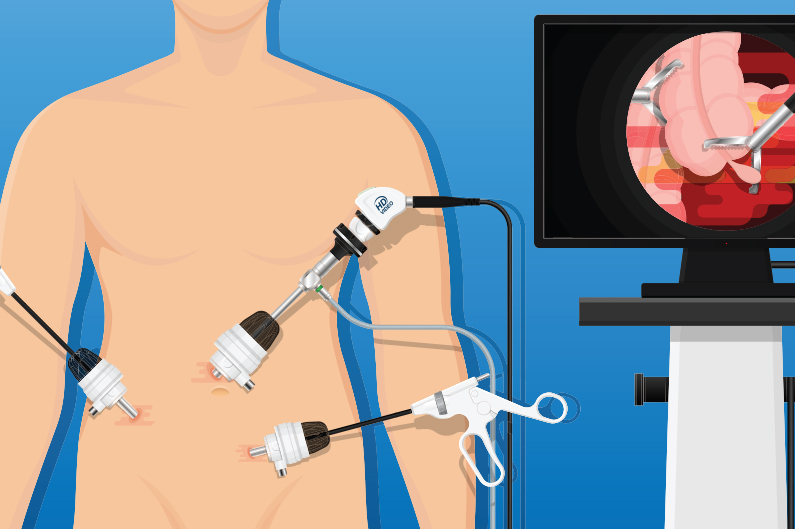What is Laparoscopic Surgery?
Laparoscopic surgery, also known as minimally invasive surgery, is a technique where surgeries are performed through small incisions using a camera and specialized instruments. This approach results in less pain, smaller scars, and faster recovery compared to traditional open surgery.
Uses of Laparoscopic Surgery
- Gallbladder Removal (Cholecystectomy)
- Hernia Repair
- Appendectomy (Appendix Removal)
- Bariatric Surgery (Weight Loss Surgery)
- Gynecological Procedures like hysterectomy
- Bowel Resection and treatment for colon issues
Symptoms Requiring Laparoscopic Surgery
- Persistent abdominal pain
- Nausea or vomiting (in cases of gallbladder or appendix issues)
- Difficulty in digestion or bloating
- Unexplained weight loss or gain
- Hernia bulging or pain
- Irregular menstrual cycles (in gynecological cases)
Procedure
The laparoscopic procedure typically involves:
- Anesthesia – General anesthesia is administered.
- Small Incisions – Tiny cuts are made, usually around 1 to 2 centimeters.
- Insertion of Laparoscope – A thin, flexible tube with a camera is inserted to view the organs.
- Surgical Instruments – Small tools are used through additional incisions to perform the surgery.
- Completion – Once the surgery is complete, the instruments are removed, and the incisions are closed with stitches or staples.
Advanced Techniques in Laparoscopic Surgery
- Robotic-Assisted Surgery: Enhances the precision and flexibility of laparoscopic surgery with robotic arms.
- Single-Port Laparoscopy: Uses a single incision, typically through the belly button, for less visible scarring.
- Natural Orifice Transluminal Endoscopic Surgery (NOTES): A newer technique that uses the body’s natural openings for surgery with no external incisions.
Why Choose India for Laparoscopic Surgery?
India is an ideal destination for laparoscopic surgery due to the following reasons:
- World-Class Surgeons: Indian surgeons are internationally trained and experienced in performing minimally invasive procedures.
- Advanced Medical Technology: Indian hospitals are equipped with state-of-the-art laparoscopic technology.
- Affordable Care: The cost of laparoscopic surgery in India is significantly lower compared to Western countries, without compromising quality.
- Shorter Recovery Times: The minimally invasive nature of the surgery ensures faster recovery and less time spent in the hospital.
Why Choose Healtour Solutions?
- Expert Guidance: Healtour Solutions connects you with the best laparoscopic surgeons in India.
- Personalized Care: Treatment plans tailored to your specific medical needs.
- Affordable & High-Quality Care: Receive world-class treatment at affordable prices.
- Comprehensive Support: From pre-operative counseling to post-operative care, we ensure your health journey is smooth and successful.
- International Standards: We work with hospitals that maintain global standards for patient safety and care.
Cost of Laparoscopic Surgery in India
The cost of laparoscopic surgery in India is significantly lower than in Western countries. Prices generally range from INR 50,000 to INR 2,50,000 (approximately USD 600 to USD 3,000), depending on the type of surgery and the hospital. The overall cost is much more affordable without compromising on the quality of care.
Benefits of Laparoscopic Surgery
- Minimal Scarring: Small incisions result in less visible scars.
- Faster Recovery: Shorter hospital stays and quicker return to daily activities.
- Reduced Pain: Less pain compared to traditional open surgery due to smaller incisions.
- Lower Risk of Infection: Smaller incisions reduce the risk of post-surgery infections.
- Improved Precision: Advanced technology and techniques allow for greater accuracy in procedures.
Post-Procedure Care
- Rest & Recovery: Resting for a few days is recommended to allow the body to heal.
- Follow-Up Appointments: Regular check-ups to monitor recovery progress.
- Pain Management: Over-the-counter pain relievers may be prescribed.
- Dietary Modifications: Eating a light, healthy diet for a few days post-surgery.
- Activity Limitations: Avoiding strenuous activities for a few weeks to prevent complications.
Frequently Asked Questions (FAQs)
- Is laparoscopic surgery safe?
Yes, laparoscopic surgery is generally very safe, with a lower risk of complications than traditional open surgery.
- How long is the recovery time?
Most patients recover within 1-2 weeks, depending on the surgery type and individual health.
- Are there any risks involved in laparoscopic surgery?
Though rare, potential risks include infection, bleeding, or injury to nearby organs.
- Can laparoscopic surgery be used for any kind of surgery?
It is commonly used for a variety of surgeries, but not all procedures are suitable for the laparoscopic approach.
- Is laparoscopic surgery more expensive?
No, laparoscopic surgery is often more cost-effective due to shorter hospital stays and faster recovery.
- Will I have visible scars after laparoscopic surgery?
Laparoscopic surgery leaves smaller scars compared to traditional surgery, often hidden in natural folds of the skin.
- How soon can I resume normal activities after surgery?
Most patients can resume normal activities within 1-2 weeks, but more strenuous activities should be avoided for 4-6 weeks.
- Do I need special aftercare following laparoscopic surgery?
Basic aftercare like avoiding heavy lifting, following prescribed medication, and attending follow-up appointments is usually sufficient.
- Can laparoscopic surgery treat all types of hernias?
Yes, laparoscopic surgery is commonly used for hernia repair and is often preferred due to quicker recovery.
- Can laparoscopic surgery be performed on elderly patients?
Yes, elderly patients can often undergo laparoscopic surgery, as it is minimally invasive and reduces recovery time.




